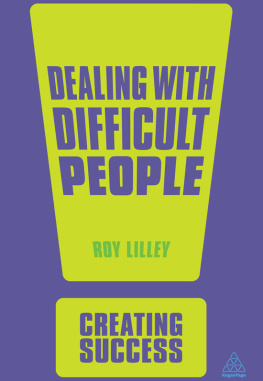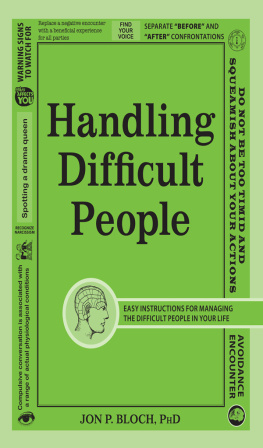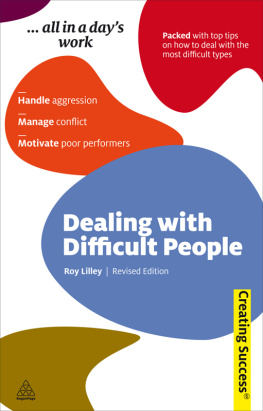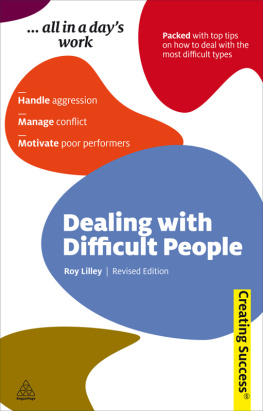David Brown - Dealing With Difficult People
Here you can read online David Brown - Dealing With Difficult People full text of the book (entire story) in english for free. Download pdf and epub, get meaning, cover and reviews about this ebook. year: 2010, publisher: HarperCollins Publishers, genre: Business. Description of the work, (preface) as well as reviews are available. Best literature library LitArk.com created for fans of good reading and offers a wide selection of genres:
Romance novel
Science fiction
Adventure
Detective
Science
History
Home and family
Prose
Art
Politics
Computer
Non-fiction
Religion
Business
Children
Humor
Choose a favorite category and find really read worthwhile books. Enjoy immersion in the world of imagination, feel the emotions of the characters or learn something new for yourself, make an fascinating discovery.
- Book:Dealing With Difficult People
- Author:
- Publisher:HarperCollins Publishers
- Genre:
- Year:2010
- Rating:4 / 5
- Favourites:Add to favourites
- Your mark:
- 80
- 1
- 2
- 3
- 4
- 5
Dealing With Difficult People: summary, description and annotation
We offer to read an annotation, description, summary or preface (depends on what the author of the book "Dealing With Difficult People" wrote himself). If you haven't found the necessary information about the book — write in the comments, we will try to find it.
- Stay calm and firm when other people cant
- Deal with difficult bosses, direct reports, and colleagues
- Create win-win scenarios
- Develop productive relationships with people you dont like
Dealing With Difficult People — read online for free the complete book (whole text) full work
Below is the text of the book, divided by pages. System saving the place of the last page read, allows you to conveniently read the book "Dealing With Difficult People" online for free, without having to search again every time where you left off. Put a bookmark, and you can go to the page where you finished reading at any time.
Font size:
Interval:
Bookmark:

If someone is being difficult in a business situation, the end result is that individuals, teams or the organization as a whole will find it difficult to function effectively and be as successful as they otherwise might. This book gives you the skills to address difficult people and difficult situations.
I have been in many situations where someone has been widely considered difficult. It can make life frustrating and even deeply unpleasant. Whilst this book will offer you lots of tips about how to handle such people, we will also look a little deeper at what makes people difficult. You will be asked also to consider situations in which you might be the cause of difficult behaviour I know that I have sometimes been considered to be the difficult one, when I was quite sure that others were being difficult!
Once you understand the root of the difficulty, you can work out a remedial strategy to suit the situation. This book captures 50 secrets presented in seven chapters that provide the key to you dealing with difficult people. You need to decide which tip will help you in which situation.
Understand what makes us tick. If you are to manage difficult behaviour successfully, you need to understand behaviour! Consider what shapes our behaviour, what behaviours you can realistically expect to change and what you cant.
Look in the mirror. You may be the problem. This chapter helps you to understand yourself and to consider how you appear to others.
Step into their shoes. If you are to help people see the need for change, you need to understand those people and discover why they are different to you. In this chapter you will be offered tips on how to create trust and rapport before attempting change.
Give difficult people a chance. There is a need for you to display leadership, even though sometimes you may not be the line manager. We will look at clear outcomes, role clarity, reinforcing appropriate behaviour and helpful communication.
Use the right tool for the situation. There are many tools that can help you manage difficult behaviour and difficult situations. Here are some of the globally accepted tools, including some psychometrics, with tips on when to use them.
Develop your skills. This chapter draws on the previous Secrets to develop your all-round ability to deal with difficult people.
Resolve conflicts effectively. We conclude with a series of checklists which will help you decide how to move forward with your difficult person.
If you find yourself saying, that person is difficult, dont condemn them before you have exhausted all the possible strategies for dealing with difficult people covered in these secrets. You may not be able to change their personality, but you can change their behaviour.
Use these secrets to promote harmony and deliver results.
People that we label difficult appear so because they behave differently to us in a manner that we may even deem unacceptable. If we are to deal successfully with difficult behaviour, we need to understand some of the fundamentals of human behaviour. This chapter offers an understanding of how we are all different, and why these differences exist. We will look at assertiveness, different communication styles, and how we all see the world through individual eyes.
Define what you mean by difficult
When problem-solving you need first to define the problem and then form a clear view of what a good solution, or outcome, will look like. If we are to manage difficult people successfully, we need to be clear about what we mean by the term difficult.
People dont normally turn up for work determined to be difficult. People that you find difficult are only difficult because they are different to you, or disagree with you, or behave in a fashion that you or your colleagues find unacceptable. Being difficult takes many forms and is a matter of perception. You will have your own criteria for what makes people difficult, but here are a few examples:
case study I worked for five years with someone who was forever pushing, shaping and driving his own agenda. He constantly interrupted colleagues in midsentence. Everyone who worked with him thought him difficult, but he was a significant factor in our teams success. My feedback, aimed at changing his behaviour,
Perfectionists. If you want a quick result, perfectionists can be infuriating. If you are the perfectionist, you will irritate those who think that good enough is okay and makes economic sense.
Control freaks. These types will annoy you by interfering when you want to be left alone to do things your way.
Creative people. They are a must if ideas are an essential part of moving forward but can be painful when you just want to get on with delivering a simple result.
Shapers. They drive the action (see Secret 5.8) and are vital in a successful team, but they take over as and when they see fit.
Aggressive or defensive people. Few people welcome aggression in business. People who are always on the defensive present problems as well. We need assertive people (see Secret 1.5).
Submissive people. This kind of behaviour can be caused by many things, including childhood experiences and feeling threatened. Their lack of confidence and fear of failure can be frustrating.
The examples above are caused by a host of different things, and that makes all of us different. Potentially, that makes all of us difficult in some peoples eyes. We need to understand enough about ourselves and others to recognize what we can reasonably expect to change and what we should find a way of living with.
Understand that everyone behaves differently to you.
had no effect whatsoever. One day we did a Belbin analysis (Secret 5.8) and he registered the most extreme shaper score that I have ever seen. I then concluded that this was so much a part of his personality that we needed to move him out of our team or accept him for what he was. We chose to live with him.
Accept that we are all different
Difficult might just mean different. This Secret will help you understand different people, so that you can accept some differences before deciding what is unacceptable and needs changing. So what causes all of us to be different?
Values. You may value punctuality but have a colleague who considers that any time will do. Many organizations promote key values to engender harmony, but an individualist may struggle to accept them.
Beliefs. Different political, cultural and religious beliefs can limit our ability to work with others.
Gender. Although some women are more aggressive than some men, on the whole women are inclined to be more empathetic than men, to value security more and to put greater emphasis on teamwork.
case study Recently I managed a project where one member of the team would say things like, that could backfire on you or that wont work. Her glass was half empty, as it were. Another team member would regularly say, its worth a try. There was no right or
Personality. Our personalities are a complex web of background, culture, beliefs, values, genes and more besides. Some combine well and productively, some abrasively yet still productively, while others are unmitigated disasters. We need to accept, though, that mankind thrives because of our differences we need to use difference, not stifle it.
Before leaving the question of differences, consider NLP (Neuro Linguistic Programming) filters. We all see the world through different filters, and if you understand this you will be well placed to manage the differences through better communication. Our different filters include:
Font size:
Interval:
Bookmark:
Similar books «Dealing With Difficult People»
Look at similar books to Dealing With Difficult People. We have selected literature similar in name and meaning in the hope of providing readers with more options to find new, interesting, not yet read works.
Discussion, reviews of the book Dealing With Difficult People and just readers' own opinions. Leave your comments, write what you think about the work, its meaning or the main characters. Specify what exactly you liked and what you didn't like, and why you think so.















